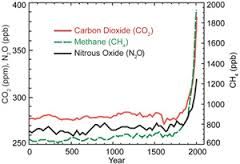Climate Change

The Earth has been subject to global climate shifts over billions of years, and these changes, ranging from extreme cold to extreme heat have altered the environments of entire regions.
Up until the Industrial Revolution, these changes were due to natural causes. But with the Industrial Revolution in the 1800s the sharp and accelerating increase in carbon dioxide emissions began to affect the atmosphere, initially in the industrial nations but gradually reaching a global scale.
The global increase in temperature began around 1900, but conditions were aggravated by ever-increasing amounts of greenhouse gases. This increase was due to heavy industry, intensive methods in farming, transportation and war. Although some very prominent scientists in the nineteenth century had considered the mechanisms of climate change, the first to raise an alert about the significant role of greenhouse gases was probably physicist Gilbert Plass, whose article in The American Scientist in the mid-1950s revived the concept. In the mid-1970s, the great geologist Wally Broecker, coined the term "global warming" and he has been a leader in the science of climate change ever since. Broecker's predictions about the course of climate change have been remarkably accurate.
Although scientists were divided initially, by the mid-1990s the evidence of the impact of CO2 was unequivocal: global warming was increasing each decade and it was no longer possible to deny the relationship between the CO2 levels produced by industry and other human sources and the fact of climate change. By 2014 climate scientists were unanimous in acceptance of the overwhelming data. The ocean carbon cycle, the global atmosphere, entire ecosystems, agriculture and human health were all being affected.
Over several decades the United Nations Intergovernmental Panel on Climate Change has posted regular and increasingly urgent warnings that a tipping point will be reached if controls on greenhouse gases cannot be imposed. Once a tipping point is reached, chemical processes triggered by greenhouse gases will be irreversible. Despite the evidence and the warnings, however, there is still a great deal of denial and disinformation, especially from the sources producing greenhouse gases. Nations seem unable or unwilling to implement the necessary global controls on CO2 emissions and commit to energy reforms.
In ancient periods of global climate change the associated chemistry was due to natural causes –sulfur and carbon dioxide from massive volcanic activity, methane leakage from the oceans, for example. The Earth eventually rebounded from those drastic environmental shifts and massive extinctions. But in the present version of climate change the clear culprit is CO2 from the use of fossil fuels. The atmospheric and ocean chemistry is much more complicated than in the past natural climate cycles. Although some rather optimistic suggestions have been made that we can address climate warming through geo-engineering, no one really knows how to control runaway reactions as conditions worsen.
